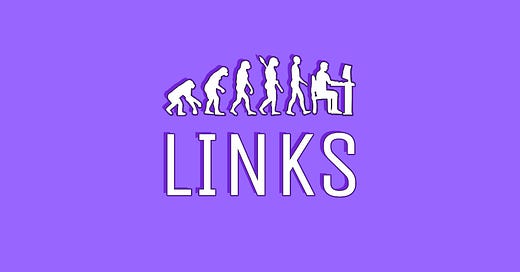LINKS - July 20th, 2022
Welcome to LINKS — my attempt to provide Rhapsody readers with five interesting stories that tell us something about what it means to be human. LINKS is published every Wednesday. Have a link you want to share? Drop it in the comments.
A Science-Based Guide to How to Act Wisely
By Arash Emamzadeh, Psychology Today
“That is what a recent paper by Glück and Weststrate has done. They have presented an integrative model of wise behavior. Published in Personality and Social Psychology Review, the main proposition of the model, which we shall discuss, is this:
“‘In challenging real-life situations, noncognitive wisdom components (an exploratory orientation, concern for others, and emotion regulation) moderate the effect of cognitive components (knowledge, metacognitive capacities, and self-reflection) on wise behavior.’”
World Unhappier, More Stressed Out Than Ever
“As 2021 served up a steady diet of uncertainty, the world became a slightly sadder, more worried and more stressed-out place than it was the year before -- which helped push Gallup's Negative Experience Index to yet another new high of 33 in 2021.”
Consciousness is irrelevant to Quantum Mechanics: An Interview with Carlo Rovelli
By Alexis Papazoglou, IAI News
“From its very inception quantum mechanics troubled physicists. It seemed to challenge our conception of reality and lead to apparent contradictions. One of the founders of quantum mechanics, Ernst Heisenberg, questioned whether the theory offered a description of reality at all. Others, like Niels Bohr, claimed that somehow human consciousness played a role in the theory. In this interview, Carlo Rovelli explains Heisenberg’s anti-realist motivations, clarifies the role of the “observer” in quantum mechanics, and articulates his relational interpretation of the theory, according to which reality is a network of interactions.”
How researchers have pinpointed the origin of ‘warm-blooded’ mammals
By Benjamin Thompson & Nick Petrić Howe, Nature
“The evolution of ‘warm bloodedness’ allowed mammals to live in a more diverse range of habitats, but working out when this occurred has been difficult. To try to pin down a date, researchers have studied the fossilized remains of ancient mammals’ inner ears, which suggest that this key evolutionary leap appeared around 230 million years ago.”
The Quest by Circadian Medicine to Make the Most of Our Body Clocks
By Kim Tingley, New York Times Magazine
“In the past two decades, however, researchers have discovered that the clock in the brain is by no means the only one in our body. It turns out that most of our cells contain a group of genes that might be thought of as gears in a mechanical watch, keeping time everywhere internally. These “clock genes” — there are at least six that are considered integral to the watch’s operation — work together the same way in each cell. And just as they cause the release of hormones in the brain, they dictate other processes in other parts of the body. In the early 2000s, advances in the ability to detect the activity of genes in various tissues revealed that the cell clocks are organized into separate organ-level clocks representing every physiological system: There’s a skin clock and a liver clock and an immune-system clock; there’s a clock for the kidney, heart, lungs, muscles and reproductive system. Each of those clocks syncs itself to the central clock in the brain like an orchestra section following its conductor.”




